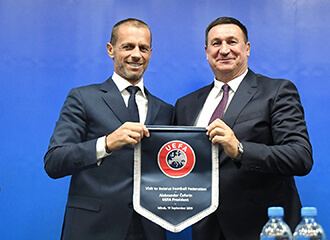На русском языке:
Мнение. Артем Шрайбман об идее «тактического отступления» демократических сил
На беларускай мове:
Меркаванне. Арцём Шрайбман пра ідэю «тактычнага адступу» дэмакратычных сіл
Within the democratic forces and sympathizers, there is an eternal discussion about a tactical retreat from part of their demands in 2020 (fair elections, amnesty for political prisoners, an end to repression) in order to go to a dialogue with the authorities and achieve at least something. Accordingly, the new sanctions from this point of view is only distancing from the goal, and also push Belarus into Russian hands.
I would not consider supporters of this point of view marginals. To some extent, it is supported by different people — speakers of the headquarters of Viktar Babaryko and Zenon Poznyak, economist Yaroslav Romanchuk and the former (and I am sure, the future too) diplomat Pavel Matsukevich. There are supporters of this view among those dissatisfied with the authorities, and even repressed, journalists, cultural figures, analysts. As for the contribution of sanctions and escalation to the strengthening of Belarus’ dependence on Russia, there is a reason, although important logical links are missing there (I discussed this a little in the last video for Zerkalo.io). But I am more interested in the argument about internal politics, which goes something like this: if we offer the authorities some olive branch, it will release political prisoners, loosen the screws, we will have oxygen inside the country, civil society will grow stronger again, and only in this way the change can be achieved.
And there are three contradictions here. The first was formulated by Euroradio journalist Zmitser Lukashuk today in an interview with one of the speakers of Babaryka’s headquarters, Ivan Kravtsov: what can you offer to the authorities? Ivan did not answer this question directly, saying that it was necessary to find out about it from the authorities themselves, to understand what they might want from us. I see two such interests — demonstrative repentance and lifting of sanctions.
The sanctions are not imposed by the opposition headquarters, this will require the will of Western capitals. Lukashenko annoyed them not only as a despot, but rather as a violator of regional stability (with planes and migrants). At the request of a part of the opposition, the West will not ease sanctions, and, for sure, this is not the general position of the democratic forces yet. And in order for it to become common, they all have to step over the request of their own electorate today, which, according to all polls, supports tough sanctions.
That is, Tsikhanouskaya, Latushka and the rest are invited to betray the expectations of their own supporters hoping that it will be possible to find new ones among the «neutrals» who are increasingly apolitical, and that Lukashenko will appreciate this gesture.
It’s unrealistic — they’re politicians and they depend on their audience. The second possible concession – public repentance – is again a path to an even more rapid loss of authority among its supporters, a kind of political harakiri. With today’s polarization of society, any serious softening of the position for opposition leaders without the authorities making concessions first is a very risky step. But the loss of their own political prospects is half the trouble.
The other half is that nature abhors a vacuum. Having felt the betrayal of the leaders, the disoriented protest electorate will begin to look for new authorities. The number of views of the speeches and interviews of Vadim Prokopyev, the lawyer of the power rebellion, speak for themselves. That is, the political self-immolation of today’s leaders may simply be meaningless – few people will follow them into the zone of softness, pragmatism and concessions to the authorities. And if it does, it will be a full-fledged split, an even greater weakening of the «front of change». And this is the second contradiction of the idea of tactical retreat – there is no sustained demand for it.
Finally, thirdly, about «Lukashenko will appreciate the gesture». It is difficult to say where the hope comes from that he will want to enter the same river three times. Even if it is possible to bargain for the freedom of some part of political prisoners (which is very important), hopes for a thaw after that are not much substantiated.
Lukashenko also learns from his mistakes and also understands that 2020 is not only a consequence of Covid and fresh faces of opponents, but also five or six years of detente. The sanctions have not become so painful for the Belarusian authorities that they thought about restarting the self-destructive process of reviving the «fifth column». And this, in my opinion, is the main obstacle to any negotiation initiatives today. The will of the second party for such a dialogue has not matured. Autocrats come to negotiations from the realization that all alternatives are even worse, and not because the opponent is confused and is looking for attempts to deceive you over a long distance, dragging you into a new detente.
The authorities are not at this point yet, no matter how much I would like to close my eyes and imagine that Makei’s visits to Sweden mean that Minsk has such an interest. When it is, Lukashenko will make it clear about it. As of December 20, he has at least 927 opportunities to do this.


